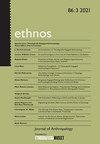CHIEFSHIP, PTY unLTD.: Reflections on Sovereign Un/Accountability, Past and Present
IF 1
3区 社会学
Q2 ANTHROPOLOGY
引用次数: 0
Abstract
ABSTRACTA number of ‘customary’ African kings and chiefs – historically accountable to the will of their subjects – have sought to turn their offices into lucrative sources of accumulation; indeed, into a form of monopoly capital founded on the assertion of a political sovereignty unaccountable to any other. What historical conditions have laid the ground for this transformation? How widespread is it? What, in the ‘new’ economies, technologies, ideologies and politics of the global order, has given the Kingdom of Custom its material, affective and political heft in this, the twenty-first century? In addressing these questions with particular focus on South Africa, this essay explores the relationship between ‘local’ structural conditions and those exogenous to the country in order to explain ongoing transformations in traditional authority – and their impact on the political and cultural economy of the nation at large.KEYWORDS: ‘Traditional’ African sovereigntyKingdom of custom‘Business chiefs,’ colonialityPostcolonialitySouth Africa Disclosure StatementNo potential conflict of interest was reported by the author(s).Notes1 Dalindyebo v S (090/2015) [2015] ZASCA 144 (1 October 2015).2 For a comprehensive account of the case, see Thamm (Citation2010).3 Congress of Traditional Leaders of South Africa v Speaker of the National Assembly and Others (2474/16) [3016] ZAWCHC 206; [2017] 2 All SA 463 (WCC) (23 November 2016).4 On contemporary South African chiefship see e.g. Oomen (Citation2005), Williams (Citation2010), Turner (Citation2014), and Krämer (Citation2016).5 See also the essays in Comaroff and Comaroff (Citation2018).6 This and some of the next paragraph are paraphrased from the same text.7 See e.g. Gluckman (Citation1940b) and Schapera (Citation1934; Citation1947).8 Berry (Citation2001) was speaking of colonial and postcolonial Asante; Capps (Citation2016: 455), however, argues that her study ‘sets the agenda for a materialist analysis of the rentier chiefship … ’ in general.9 Case no. 12745/2018P, 11 June 2021; https://www.groundup.org.za/media/uploads/documents/itb_judgment_11_june_2021.pdf.10 All quotes in this and the next paragraph are from Cook (Citation2018: 211–214). Approximately 2,000 mineworkers attended the gathering.11 Leruo has not escaped criticism as a ruler, although his hold on his office remains strong (Comaroff & Comaroff Citation2009: 109). He has also been respondent to a lawsuit filed by the Bafokeng Land Buyers’ Association, which claims that much of ‘his’ territory actually belongs to the ‘individual communities forming the Bafokeng ‘tribe’ … [who bought it] in the mid-19th century;’ https://bafokeng-landbuyers.org/.12 Throughout the trial, Zuma had vocal support from the ANC Women’s League.13 Every indigenous ruler I encountered in the North West and KwaZulu-Natal expressed a desire to take their polities into the market and of being a ‘business chief’; the variance in their success in doing so, however, makes it impossible to quantify the phenomenon.首席,PTY有限公司:对主权联合国/问责制的反思,过去和现在
一些“习惯的”非洲国王和酋长——历史上对其臣民的意志负责——试图将他们的职位变成利润丰厚的积累来源;事实上,变成了一种垄断资本的形式,它建立在一种对任何其他国家都不负责任的政治主权的主张之上。什么样的历史条件为这种转变奠定了基础?它有多普遍?在全球秩序的“新”经济、技术、意识形态和政治中,是什么赋予了“风俗王国”在二十一世纪的物质、情感和政治上的分量?在以南非为重点解决这些问题时,本文探讨了“当地”结构条件与该国外生条件之间的关系,以解释传统权威的持续转变及其对整个国家政治和文化经济的影响。关键词:“传统”非洲主权;海关王国;商业领袖;殖民;后殖民;南非披露声明作者未报告潜在的利益冲突。注1 Dalindyebo v S (090/2015) [2015] ZASCA 144(2015年10月1日有关该案例的全面描述,请参见Thamm (Citation2010)南非传统领袖大会诉国民议会议长和其他人(2474/16)[3016]ZAWCHC 206;[2017] All SA 463 (WCC)(2016年11月23日)关于当代南非酋长,参见Oomen (Citation2005), Williams (Citation2010), Turner (Citation2014)和Krämer (Citation2016)参见《Comaroff and Comaroff》(Citation2018)中的文章这一段和下一段的部分内容是改写自同一文本参见Gluckman (Citation1940b)和Schapera (Citation1934;Citation1947)。8Berry (Citation2001)说的是殖民时期和后殖民时期的阿散蒂;然而,Capps (Citation2016: 455)认为,她的研究总体上“为食利者首领的唯物主义分析设定了议程……情况下没有。12745/2018P, 2021年6月11日;https://www.groundup.org.za/media/uploads/documents/itb_judgment_11_june_2021.pdf.10本段和下一段的所有引用均来自库克(Citation2018: 211-214)。大约有2 000名矿工参加了这次会议作为一个统治者,勒若并没有逃脱批评,尽管他对他的办公室的控制仍然很强(Comaroff & Comaroff Citation2009: 109)。他还曾被巴福坑土地买家协会提起诉讼,该协会声称,“他的”大部分领土实际上属于“组成巴福坑“部落”的个人社区……[他们在19世纪中期购买了它]”;https://bafokeng-landbuyers.org/.12在整个审判过程中,13我在西北和夸祖鲁-纳塔尔省遇到的每一位土著统治者都表示希望将他们的政策纳入市场,并成为“商业领袖”;然而,他们成功的差异使得无法量化这种现象。
本文章由计算机程序翻译,如有差异,请以英文原文为准。
求助全文
约1分钟内获得全文
求助全文
来源期刊

Ethnos
ANTHROPOLOGY-
CiteScore
3.80
自引率
0.00%
发文量
31
期刊介绍:
Ethnos is a peer-reviewed journal, which publishes original papers promoting theoretical, methodological and empirical developments in the discipline of socio-cultural anthropology. ethnos provides a forum where a wide variety of different anthropologies can gather together and enter into critical exchange.
 求助内容:
求助内容: 应助结果提醒方式:
应助结果提醒方式:


